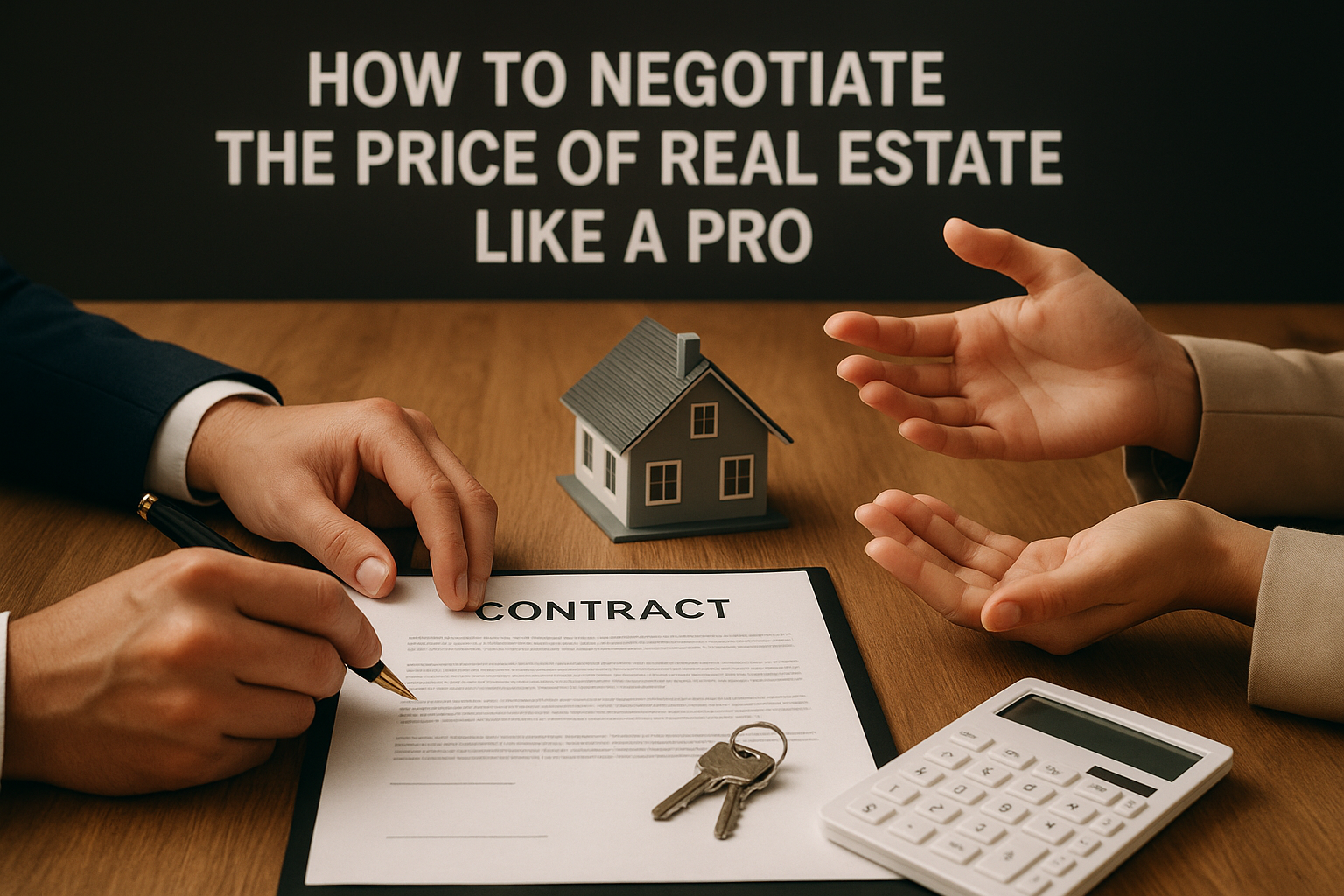How to Negotiate the Price of Real Estate Like a Pro: Ultimate Guide
August 23, 2025
Buying property is one of the most important financial steps in life. Whether you are a first-time homebuyer, a real estate investor, or someone looking for a vacation home, negotiating the price with the seller is a skill that can save you thousands of dollars.
Table of contents for the article
ToggleIn this ultimate guide, you will learn step-by-step strategies, proven negotiation techniques, and psychological insights that will help you master real estate negotiations. By the end, you’ll know exactly how to negotiate a house price with confidence and achieve the best possible deal.
Why Negotiating Real Estate Prices Matters
When buying property, even a 2–5% reduction can equal thousands of dollars saved. For example:
A $300,000 home → 5% discount saves you $15,000.
A $600,000 home → 5% discount saves you $30,000.
That’s enough to fund renovations, reduce mortgage payments, or cover closing costs.
But beyond money, successful real estate price negotiation:
Positions you as a smart buyer.
Improves chances of seller cooperation.
Unlocks extras like free repairs, appliances, or flexible move-in dates.
👉 Bottom line: Negotiating real estate is not optional—it’s essential.
Understanding the Market Before Negotiating
The first rule of negotiation: know the market.
Buyer’s Market: Lots of properties, fewer buyers → sellers more flexible.
Seller’s Market: Fewer properties, high demand → buyers need creative tactics.
Neutral Market: Balance of supply and demand → negotiations are moderate.
💡 Tools to check market conditions:
Zillow, Realtor.com, Redfin, Trulia (for U.S. buyers).
Local MLS reports.
Real estate agents’ market summaries.
Always compare comps (similar properties recently sold) before making an offer.
Seller Psychology: The Hidden Side of Negotiations
Behind every sale, there’s a story. Sellers have different motivations, and understanding them is key.
Common Seller Motivations:
Urgency (relocation, job transfer, financial pressure).
Profit-maximization (investors cashing out).
Lifestyle change (downsizing, upsizing, retirement).
Emotional factors (memories attached to the property).
👉 Tailor your strategy: if a seller needs speed, offer a fast closing instead of only pushing on price.
Preparation: Your Secret Weapon
Steps to Prepare:
Get Mortgage Pre-Approval – shows you are serious.
Research Comparable Sales – know the realistic value.
Inspect the Property – find repair costs as leverage.
Decide Your Walk-Away Price – never negotiate without limits.
Step-by-Step Real Estate Negotiation Process
Build Rapport
People sell to those they trust. Smile, be respectful, show genuine interest in the property.
Ask the Right Questions
“How long has it been on the market?”
“Why are you selling?”
“Have you had offers yet?”
Answers reveal leverage.
Anchor the Price
Start lower than your maximum budget. Example:
Listing: $500,000
You offer $460,000
Seller counters at $490,000
Final price: $475,000 → you save $25,000.
Leverage Silence
Make your offer, then stop talking. Silence creates pressure on the seller.
Highlight Property Flaws
Point out repair needs politely. Use inspection results to justify a lower offer.
Offer Non-Financial Benefits
Faster closing.
Waiving small contingencies.
Flexible move-in date.
Know When to Walk Away
Never negotiate from desperation. Having alternatives gives you power.
Negotiating with Agents vs. Directly with Sellers
Agents: Professionals, logical, trained → use data, comps, and legal terms.
Direct Sellers: Emotional, attached to property → use empathy and rapport.
Advanced Negotiation Tactics
The Split-the-Difference Strategy – propose middle ground to close deals.
Time Pressure – “My offer is valid for 48 hours.”
Multiple Offers Play – mention (without lying) that you are considering other properties.
Escalation Clauses – automatically raise your bid if competing offers appear.
Cultural and Regional Differences
USA & Canada → direct but polite negotiations.
Europe → more formal, often slower decision-making.
Asia & Middle East → bargaining is expected, patience is respected.
Common Mistakes to Avoid
Lowballing too aggressively.
Showing emotional attachment.
Ignoring seller’s motivations.
Not doing market research.
Overcomplicating offers with too many conditions.
Case Studies: Successful Real Estate Negotiations
Case 1: The Investor Win
Investor in Texas bought a $350,000 rental for $310,000 by offering a quick cash close.
Case 2: The First-Time Buyer
Family in Florida saved $18,000 by pointing out roof repairs and securing seller-paid closing costs.
Case 3: The Patient Negotiator
Buyer in California waited 90 days, then negotiated $40,000 off asking price as the seller’s urgency increased.
Checklists for Buyers
Pre-Negotiation Checklist
✅ Mortgage pre-approval
✅ Market research
✅ Walk-away price set
✅ Property inspection scheduled
During Negotiation Checklist
✅ Start with lower anchor offer
✅ Stay calm and polite
✅ Ask questions about seller’s needs
✅ Use silence wisely
✅ Offer extra value beyond money
FAQ: Real Estate Negotiations
Q1: How much should I offer below asking price?
👉 Typically 5–10% below asking, unless in a hot seller’s market.
Q2: Should I use a real estate agent to negotiate?
👉 Yes, especially for first-time buyers. Agents know local tactics.
Q3: Is it rude to negotiate on price?
👉 No—negotiation is expected in real estate almost everywhere.
Q4: What if the seller refuses to lower the price?
👉 Ask for concessions (repairs, appliances, closing costs).
Q5: How do I win in a bidding war?
👉 Use escalation clauses, write a personal buyer letter, and show financial readiness.
Conclusion: Become a Negotiation Master
Negotiating real estate is both an art and a science. By understanding the market, preparing thoroughly, and applying proven negotiation tactics, you can save money, reduce stress, and close deals successfully.
Remember: The best negotiators are not aggressive but strategic, respectful, and patient. Every dollar saved today builds your financial freedom tomorrow.








